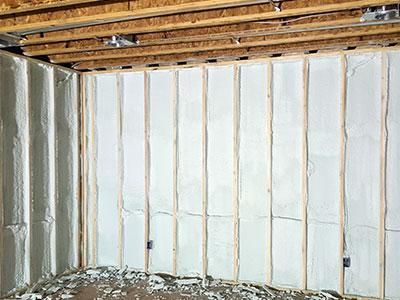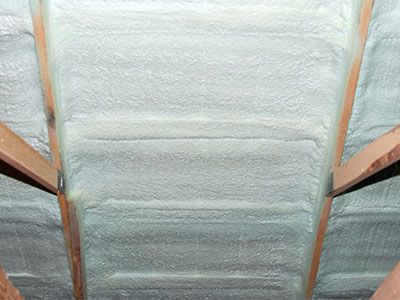Closed Cell Spray Foam Insulation in Kansas City
Closed cell spray foam insulation is suitable for the interior and exterior of your home or building. Closed cell spray foam is energy efficient, has the highest R-value, is moisture resistant, and serves as an air barrier. Whether you are insulating your basement or your attic space, closed cell spray foam insulation can effectively do the trick.
About Closed Cell Spray Foam Insulation
Unlike traditional insulations, closed cell spray foam does not need to be installed at 12-14 inches thick. Most closed cell applications only require 2 inches. At 2 inches of thickness, closed cell spray foam can stop 94.4% of heat transfer, which allows your home to be effectively insulated year-round.
Besides insulating your home, closed cell spray foam insulation can help resist moisture and vapor within your home. In colder climates, where vapor barriers are more important, closed cell spray foam is a perfect fit. In as little as 1.5 inches, closed cell spray foam acts as a robust vapor barrier. While closed cell spray foam is not as effective as a sound barrier as open cell spray foam, it does stop air flow which can reduce dust and pollen from entering your home.

Three Advantages of Closed Cell Spray Foam Insulation
1. Highest R-Value
Closed cell spray foam has the highest R-Value of any type of insulation on the market, including other types of spray foam. Its R-Value can range from 5-7.5 per inch, which makes it more effective as insulation compared to open cell spray foam which has an R-Value of 3.5-4 per inch. Like most spray foams, the superior R-Value is only one benefit of using a closed cell spray foam for your unique application.
2. Moisture-Resistant
Using closed cell spray foam in a high-moisture area is a great idea. Closed cell spray foam is moisture-resistant and can handle damp areas like crawl spaces, livestock buildings, vehicle wash bays, basements, and many other harsh locations. If you are unsure whether closed cell spray foam would work in your high-moisture environment, please contact us to talk to a qualified spray foam specialist.
3. Air-Tight Seal
One of the most important advantages to closed cell spray foam insulation is the ability to be an air barrier. The Department of Energy reports that 30% of heating and cooling costs come from poorly sealed homes. Closed cell spray foam insulation’s air-tight seal can keep your home well insulated and reduce your HVAC utility costs.

FAQs About Closed Cell Spray Foam Insulation
Where can you install closed cell spray foam insulation?
Closed cell spray foam is a good fit in walls, attic spaces, pole barns, and basements. Basements are a great place for closed cell spray foam insulation because the unique properties of close cell spray foam act a vapor barrier and is exceptionally moisture-resistant. Closed cell spray foam is a perfect choice to spray on concrete or masonry walls as well. Using standard fiberglass insulation on a concrete or masonry wall is a poor choice as the concrete wicks water into the fiberglass, causing it to mold which can lead to serious health problems.
What is the biggest advantage to closed cell spray foam insulation?
The biggest advantage to closed cell spray foam insulation is the moisture-resistance. The moisture-resistance and air-tight barrier help to keep your home mold and mildew free. Keeping mold, mildew, dust, and pollen out of your home keeps quality air flow within your home. Many other insulation options fall short when it comes to quality moisture resistance in comparison to closed cell spray foam.
What is the biggest advantage to closed cell spray foam insulation?
The biggest advantage to closed cell spray foam insulation is the moisture-resistance. The moisture-resistance and air-tight barrier help to keep your home mold and mildew free. Keeping mold, mildew, dust, and pollen out of your home keeps quality air flow within your home. Many other insulation options fall short when it comes to quality moisture resistance in comparison to closed cell spray foam.
Is closed spray foam better than open spray foam?
Closed cell spray foam insulation is best if you need spray foam insulation installed in a place where moisture or water vapor are a concern. Also, closed cell spray foam is beneficial if space is an issue as the high R-Value keeps the application of spray foam less dense. Both open cell spray foam insulation and closed cell spray foam insulation have their specific benefits. Depending on where your house is located, what your insulation goals are and what your budget is helps to decide which is better for your unique situation. If you need help deciding between open cell spray foam insulation and closed cell spray foam insulation, please contact us today.
Content Reviewed by Mark King